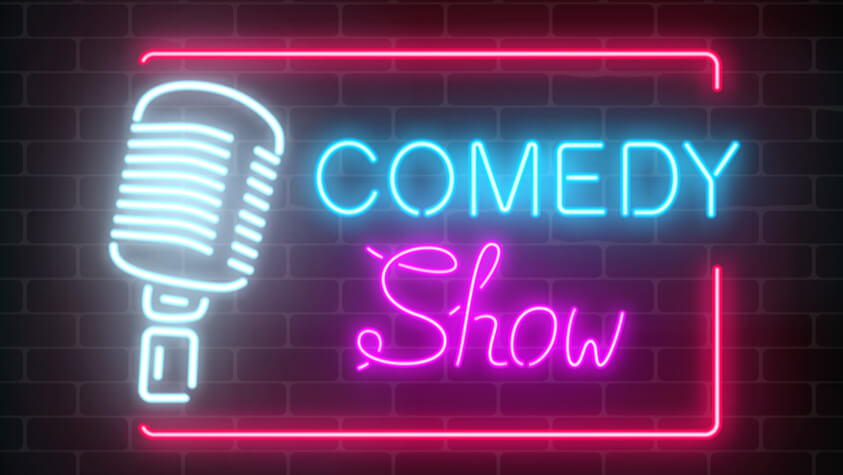By TACP Staff on July 27, 2021

A comedian is a person who uses jokes, amusing observations, and satire to entertain an audience. Making people laugh is both a natural artistic talent and a product of serious work to hone one’s delivery and craft. Today’s most successful comics often have opportunities in other areas of entertainment, such as television and film, where they can grow their following and become even more widely known.
Stand-up comedy is a type of comedic routine that involves a comedian standing in front of a live audience for the sole purpose of making them laugh. Contrary to popular belief, this is usually much harder than it looks.
Joke telling is not thing involved in stand-up comedy. Oftentimes, stand-up comedy shows will involve comedians talking about and telling stories about their lives, and the world around them. Some stand-up comedy shows may even involve other elements as well, such as props or music.
Every stand-up comedian usually has his own style, and the most talented and famous comedians are usually remembered for these styles. Here are a few examples of some famous stand-up comedians and what they are usually remembered for:
Gallagher performed before a live audience and told jokes and stories in order to get them to laugh, much like other stand-up comedians. Gallagher was also a prop comedian as well, however. He was most known for his Sledge-O-Matic, which was a very large wooden sledgehammer that he used to smash various objects. Watermelons were usually his preferred choice, but he also smashed other objects as well.
George Carlin was a popular stand-up comedian who started his career in the 60’s. He was a master of observational humor – the most common type of stand-up comedy – but he was most well known for his “black humor”. Carlin made his audiences laugh by presenting taboo subjects in a humorous light.
Jeff Foxworthy is an observational stand-up comedian who poked fun at country bumpkin and so-called “redneck” lifestyles. Foxworthy is most well known for his “You might be a redneck, if…” jokes.
Stand-up comedians perform in front of live audiences. The majority of these comedians are well-versed in observational comedy. This involves presenting ordinary everyday situations in a humorous light.
As mentioned above, most stand-up comedians develop their own styles. A comedian’s style will often be a mix of two or more different types of comedy, including improvisational comedy, prop comedy, slapstick comedy, character comedy, and deadpan comedy. Some comedians may even choose to interact with members of the audience.
Comedy routines are humorous acts that stand-up comedians perform. These acts can be as short as a few minutes, and as long as an hour or more, depending on how long a comedian has to perform. The majority of stand-up comedians will take several months, or even years, to develop their routines.
With the exception of improv comedians, most stand-up comedians must commit each of their routines to memory. Forgetting lines in their routines – especially the punch lines – can result in audience members getting bored or hecklers harassing the comedian.
Technically, a stand-up comedy career does not require any sort of formal education. Most comedians are just born with an extra-large funny bone. Some comedians may find their true calling after attending open mic nights at their local comedy clubs.
Comedy schools and institutes, on the other hand, may be excellent options for anyone interested in a stand-up comedy career. Two examples of comedy schools include the American Comedy Institute and San Francisco Comedy College. These schools offer programs and courses in a few different types of comedies, as well as courses in things like voice coaching.
A stand-up comedian should obviously be very funny. He should have a great personality, and making people laugh should be like second nature.
Individuals interested in a stand-up comedy career should also be able to come up with original jokes or humorous observations on a regular basis. Typically, the most successful and popular stand-up comedians will have several different routines that they use, which helps keep their loyal followers from getting bored. This is especially important since no one likes a boring comedian – they just aren’t funny.
Individuals looking to become a comedian should also have an excellent memory as well as the ability to think on his feet. He must be able to memorize each of his routines. If something goes awry, however, he should be able to come up with something humorous off the top of his head.
The typical salary of a stand-up comedian is usually rather difficult to pin down. For instance, funnier and more popular stand-up comedians may make thousands of dollars doing just one show.
The Bureau of Labor Statistics does not record specific data about the salaries of stand-up comedians. Entertainers and performers in general, however, made roughly $22.71 per hour in 2017. Other sources, on the other hand, reported that stand-up comedians could make roughly $30,000 or more annually.
A stand-up comedian might perform in a variety of different venues. For example, bars and comedy clubs often hire stand-up comedians to entertain their patrons. Some comedians may be invited to perform in special comedy shows in concert halls or theaters as well. During these types of show, a comedian may perform alone or with a group of other performers, usually comedians.
Consider these related careers in Performing Arts.

The Art Career Project is a trusted resource for emerging and professional artists.